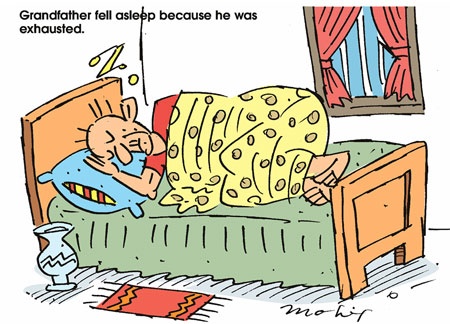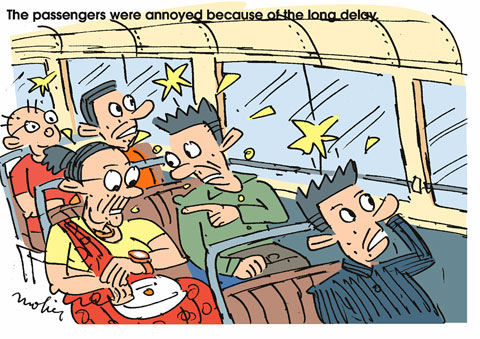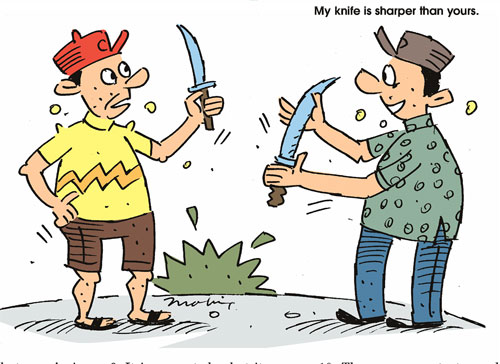|

by R. S. Karunaratne
Adverbial phrases with ‘because of’
We have already learnt that an adverbial clause has a finite verb.
However, an adverbial phrase does not have a finite verb.
People suffered for 30 years because there were terrorist activities.
(Adverbial clause)

People suffered for 30 years because of terrorist activities.
(Adverbial phrase)
The children enjoyed the story because it was humorous. (Adverbial
clause)
The children enjoyed the story because of its humour. (Adverbial phrase)
Grandfather fell asleep because he was exhausted. (Adverbial clause)
Grandfather fell asleep because of his exhaustion. (Adverbial phrase)
The country is prospering because he leads it. (Adverbial clause)
The country is prospering because of his leadership. (Adverbial phrase)
We are a strong nation because we are united. (Adverbial clause)
We are a strong nation because of our unity. (Adverbial phrase)
An adverbial clause with ‘because’ and an adverbial phrase with
‘because of’ answer the question ‘Why?’Shani complained about him
because of his rudeness.
Sam tapped on the door because he wanted to draw her attention.
They are unhappy because of their separation.
The passengers were annoyed because of the long delay.
I seldom visit her because of the distance.
Fans are drawn to her because she is a popular actress.
An adverbial phrase beginning with ‘because of’ must be followed by a
noun.
However, the noun can have an article or a possessive pronoun before it.
He was promoted because of his loyalty to the company.
Jane broke her arm because of a fall from a tree.
People were annoyed because of his long speech.
I seldom meet her because of our strained relationship.
You are respected because of your principles.

[Activity]
Underline the correct word or words in the following sentences.
Check your answers with the key.
1. We hurried home because / because of the rain.
2. The trade union put off the strike because / because of the company
agreed to its demands.
3. The boat sank because / because of the storm.
4. The boys teased him because / because of his long nose.
5. Chris won the award because / because of he practised hard to win the
race.
6. King Dutugamunu won the Vijithapura battle because / because of
his strong army.
7. I failed the examination because / because of my carelessness.
8. She found it difficult to manage her hair because / because of its
unusual length.
9. Everyone had a difficult time because / because of their unruly
behaviour.
10. The fight broke out because / because of they could not resolve
their dispute.
[Key]
Because of 2. because 3. because of 4. because of 5. because 6.
because of 7. because of 8. because of 9. because of 10. because
Fun with proverbs
Proverbs offer advice or present a moral in a short or pithy manner.
Once proverbs had the status of universal truths and were used to prove
arguments.
1. Better one house spoiled than two.
When two foolish or wicked people get married they trouble only
themselves.
2. The better the day, the better the deed.
The proverb is used to justify working on a holiday.
3. Better the devil you know than the devil you don’t know.
In common parlance, a known person is better than a complete stranger.
4. It is better to be born lucky than rich.
Luck causes you to have money. However, if you are born rich, you will
lose it.
5. It is better to give than to receive.
Most religions promote the act of giving than receiving.
6. Better to be loved and lost, than never to have loved at all.
The meaning is quite obvious. Only a person who has loved someone will
know its powerful experience.
7. Better to light one candle than to curse the darkness.
Some people always curse the darkness without doing anything to dispel
it. One who lights a candle helps others to get rid of darkness.
8. Better to live one day as a tiger than thousand years as a sheep.
The tiger is a symbol of strength and fearlessness. However, the sheep
represents cowardice.
9. It is better to travel hopefully than to arrive.
We derive happiness through travelling. When once we reach our
destination, our happiness vanishes.
10. Better to wear out than to rust out.
Remain active than idling. The proverb is used particularly with
reference to elderly people.
11. Better wed over the mixen than over the moor.
It is more advisable to marry a neighbour than a stranger.
12. Between two stools one falls to the ground.
If you are unable to choose between alternative viewpoints, you are
likely to end in disaster.
13. A bird in the hand is worth two in the bush.
It is better to be content with what you have than trying to get more
and risk losing everything.
14. Birds in their little nests agree.
Young children should not argue among themselves.
15. Birds of a feather flock together.
People of the same character (usually unscrupulous) get together like
the birds of the same species.
Starters:
Comparative forms of adjectives
To describe a single person or thing we use an adjective. However,
when we have to compare two people or things we use a different form of
the adjective.
Nalin is a tall man.
Bryan is taller than Nalin.

My sister is ten years old.
My brother is older than my sister.
Bus travel is cheap.It is cheaper to go by train than by bus.
We add ‘er’ to short adjectives to make them comparative adjectives.
Lalith is nicer than Gamini.
Colombo is bigger than Matale.
Today is warmer than yesterday.
My knife is sharper than yours.
This box is larger than that.
We add ‘ier’ to adjectives of two syllables to make them comparative
adjectives.
Don’t post any letters.
It’s easier to phone me.
My bag is heavy but yours is heavier.
Aruni is a pretty girl but her sister Varuni is prettier.
I am usually busier than you.
My car is costlier than yours.
We add ‘more’ to long adjectives having more than two syllables.
We are going to move into a more modern house.
Some people are more polite than others.
My car is more expensive than yours.
Your stories are interesting but grandmother tells us more
interesting tales.
You must be more careful talking to strangers.
Some adjectives have different forms in the comparative degree.
Yesterday’s weather was very good but it’s better today.
I have a bad headache but my toothache is worse.
The station is far from my house.
The library is further from my house.
[Activity]
Complete the following sentences using comparative adjectives.
Check your answers with the key.
1. My car is small, but I want to buy a ............. vehicle.
2. This house isn’t modern. We wish to move into a ...............
apartment.
3. You’re tall but your brother is ...............
4. Some workers don’t work very hard but I work ................ than
others.
5. My bed is very comfortable but your’s is ....................
6. The red flowers are nice, the white ones are .............
7. My bag isn’t very heavy but your’s is ...................
8.Anula is not interested in politics but she is .................. in
history.
9. It is warm today but it was .................. yesterday.
10. These mangoes taste good but the apples are ..................
[Key]
1. smaller 2. more modern 3. taller 4. harder 5. more comfortable 6.
nicer 7. heavier 8. more interested 9. warmer 10. tastier
Forming adjectives from nouns
It is useful to know how to build word families.
For a start, let’s make adjectives from nouns.
Write the relevant adjective against each noun and check your answers
with the key.
[Noun] [Adjective]
1. photo ...................
2. picture ...................
3. place ...................
4. plan ...................
5. play ...................
6. pleasure ...................
7. poem ...................
8. point ...................
9. politeness ...................
10. politics ....................
11. popularity ....................
12. population ....................
13. possibility ....................
14. post ...................
15. power ....................
16. practicality ....................
17. practice .....................
18. precision ....................
19. preference .....................
20. preparation .....................
21. presence .....................
22. pressure .....................
23. prevention ....................
24. price ....................
25. print ....................
26. privacy ....................
27. probability .....................
28. process .....................
29. product .....................
30. profession .....................
31. profit .....................
32. progress .....................
33. proof .....................
34. protection .....................
35. provision .....................
36. publicity .....................
37. punishment .....................
38. purity .....................
39. purpose .....................
40. push .....................
[Key]
1. photogenic
2. pictorial
3. misplaced
4. unplanned
5. playful
6. pleasant
7. poetic
8. pointed
9. polite
10. political
11. popular
12. populated
13. possible
14. postal
15. powerful
16. practicable
17. practised
18. precise
19. preferential
20. prepared
21. present
22. pressed
23. preventable
24. priceless
25. printed
26. private
27. probable
28. processed
29. productive
30. professional
31. profitable
32. progressive
33. proven
34. protected
35. provisional
36. published
37. punishable
38. pure
39. purposeful
40. pushy |


